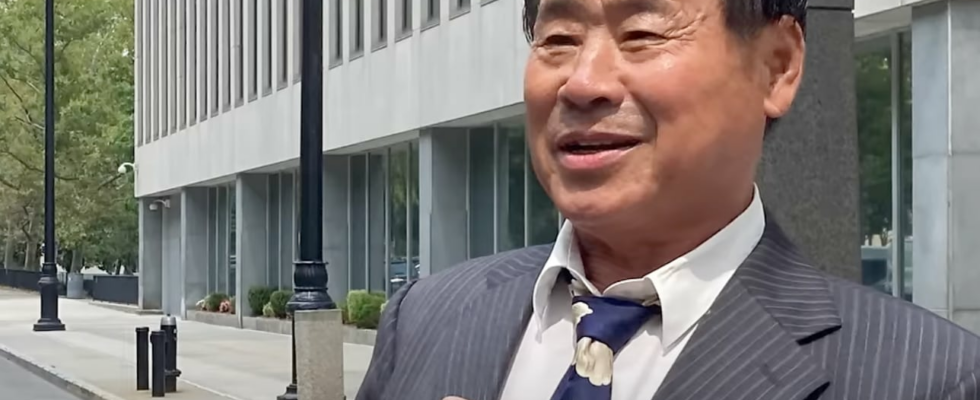He settled in the United States in 1994, taught at universities and wrote numerous books. Deeply integrated into the Chinese diaspora across the Atlantic, he was a respected and appreciated figure in the pro-democracy struggle. Thus, some will fall out of the closet to learn that he was in reality only a Trojan horse of the Chinese Communist Party which is full of inventiveness when it comes to spying on its dissident nationals who have gone to live abroad. In any case, this is the opinion of the American justice system which, on Tuesday August 6, found Shujun Wang guilty: he is accused of having used his reputation as a democratic activist to serve the interests of Beijing.
A decision rendered at the end of a week-long trial, during which the New York judges tried to shed light on the septuagenarian’s double life. A masquerade lasting more than a decade, which began in 2005. Because from the mid-2000s, while continuing to wear the costume of opponent of the Chinese regime, Shujun Wang began to speak regularly with executives of the national intelligence agency in Beijing. A committee to which the writer communicates a lot of information on pro-democracy nationals established in the United States. And this, by following a clever method which, applied to the case of a writer, is likely to go unnoticed. At least, long enough to be effective.
An Undercover Agent’s Logbook
For several years, the naturalized American academic kept a diary in which he recounted his daily days: conversations, meetings, and projects organized by critics of the Chinese government. Among them were pro-democrats from Hong Kong, supporters of the independence of Taiwan and Tibet, and Uighur activists. One of the writings read by the prosecutors concerns in particular the events commemorating the 1989 demonstrations and the bloody repression in Tiananmen Square in Beijing.
Over the course of several months, the FBI discovered the rather exhaustive summaries written by Shujun Wang, and compiled in the “drafts” section of a messaging platform. An ingenious way of having his reports read by the Chinese services that have access codes without leaving any traces of digital exchanges. The channels, however, remain varied. To transmit details on upcoming pro-democracy events, Wang also uses encrypted messaging applications. It is via this channel that he gives, for example, information to Chinese intelligence on plans to meet with a prominent Hong Kong dissident passing through the United States.
A spy under surveillance for ten years
At the turn of the 2010s, the ties between the American writer and China became closer. Between 2015 and 2017, the academic made no fewer than three trips to China, at least one of which was reportedly paid for by the Chinese Ministry of State Security. On the lookout for any Chinese incursion on their soil, the United States began to take an interest in the academic’s back-and-forths and relations with the government of his native country. In 2017, the FBI went to meet him and questioned him. The first interview in a long list, during which Shujun Wang denied any connection with Beijing’s services.
But under the insistence and pressure of federal agents, the retired professor finally admits that the intelligence agency asked him to collect information on pro-democracy groups and even admits to having satisfied Beijing’s requests more than once. From there, the American agents set several traps for Shujun Wang.
In 2021, for example, an undercover agent posing as an affiliate of the Chinese Ministry of Security made contact with Shujun Wang. The two men met several times and had regular exchanges. At the trial, when asked by the defense lawyer: “He was very open and talkative with you, wasn’t he?”, the agent testifying under a pseudonym answered in the affirmative. A curious defense strategy described as “sometimes shaky” by Radio Free Asia (RFA), a witness on several occasions to the anger of the accused, “who expressed his own frustration with one of his lawyers.”
Twenty-five years behind bars?
Like the day when, in court and under the gaze of journalists, Shujun Wang vehemently urged his defense to place more emphasis on his past as a writer and emeritus professor. But it was not enough, since after seven days of hearings, the judges found him guilty. First, for having provided the contact information of prominent dissidents to the Chinese intelligence agency. Second, for having lied to federal agents, and for having failed in his duty to declare himself a foreign agent to the attorney general.
A decision denounced by Shujun Wang himself in his native language. “This verdict seems unfair to me,” he told our colleagues at RFA, while specifying that he had not yet decided whether or not he would appeal the judgment. If this is not the case, the co-founder of the pro-democracy laboratory Hu Yaobang Zhao Ziyang Memorial Foundation, who faces up to twenty-five years in prison, will be finally sentenced on January 9. Thus, he allowed himself a humorous pirouette as he left the court: “Rather than a book on the pro-democracy movement, I plan to write one on life in American prisons.” The title is even already found: An American Prison Memoir.
